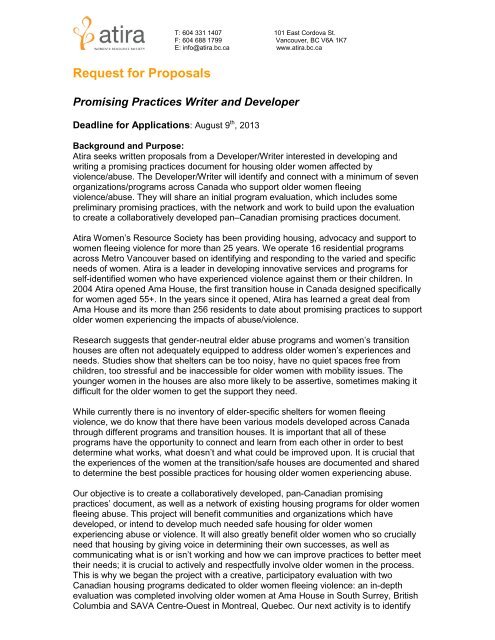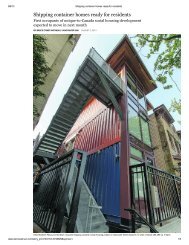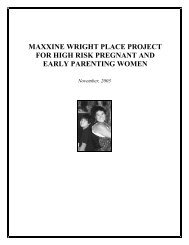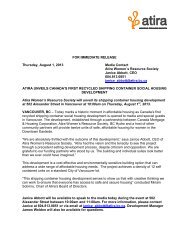Request For Proposals - Atira Women's Resource Society
Request For Proposals - Atira Women's Resource Society
Request For Proposals - Atira Women's Resource Society
You also want an ePaper? Increase the reach of your titles
YUMPU automatically turns print PDFs into web optimized ePapers that Google loves.
T: 604 331 1407 101 East Cordova St.F: 604 688 1799 Vancouver, BC V6A 1K7E: info@atira.bc.ca www.atira.bc.ca<strong>Request</strong> for <strong>Proposals</strong>Promising Practices Writer and DeveloperDeadline for Applications: August 9 th , 2013Background and Purpose:<strong>Atira</strong> seeks written proposals from a Developer/Writer interested in developing andwriting a promising practices document for housing older women affected byviolence/abuse. The Developer/Writer will identify and connect with a minimum of sevenorganizations/programs across Canada who support older women fleeingviolence/abuse. They will share an initial program evaluation, which includes somepreliminary promising practices, with the network and work to build upon the evaluationto create a collaboratively developed pan–Canadian promising practices document.<strong>Atira</strong> Women’s <strong>Resource</strong> <strong>Society</strong> has been providing housing, advocacy and support towomen fleeing violence for more than 25 years. We operate 16 residential programsacross Metro Vancouver based on identifying and responding to the varied and specificneeds of women. <strong>Atira</strong> is a leader in developing innovative services and programs forself-identified women who have experienced violence against them or their children. In2004 <strong>Atira</strong> opened Ama House, the first transition house in Canada designed specificallyfor women aged 55+. In the years since it opened, <strong>Atira</strong> has learned a great deal fromAma House and its more than 256 residents to date about promising practices to supportolder women experiencing the impacts of abuse/violence.Research suggests that gender-neutral elder abuse programs and women’s transitionhouses are often not adequately equipped to address older women’s experiences andneeds. Studies show that shelters can be too noisy, have no quiet spaces free fromchildren, too stressful and be inaccessible for older women with mobility issues. Theyounger women in the houses are also more likely to be assertive, sometimes making itdifficult for the older women to get the support they need.While currently there is no inventory of elder-specific shelters for women fleeingviolence, we do know that there have been various models developed across Canadathrough different programs and transition houses. It is important that all of theseprograms have the opportunity to connect and learn from each other in order to bestdetermine what works, what doesn’t and what could be improved upon. It is crucial thatthe experiences of the women at the transition/safe houses are documented and sharedto determine the best possible practices for housing older women experiencing abuse.Our objective is to create a collaboratively developed, pan-Canadian promisingpractices’ document, as well as a network of existing housing programs for older womenfleeing abuse. This project will benefit communities and organizations which havedeveloped, or intend to develop much needed safe housing for older womenexperiencing abuse or violence. It will also greatly benefit older women who so cruciallyneed that housing by giving voice in determining their own successes, as well ascommunicating what is or isn’t working and how we can improve practices to better meettheir needs; it is crucial to actively and respectfully involve older women in the process.This is why we began the project with a creative, participatory evaluation with twoCanadian housing programs dedicated to older women fleeing violence: an in-depthevaluation was completed involving older women at Ama House in South Surrey, BritishColumbia and SAVA Centre-Ouest in Montreal, Quebec. Our next activity is to identify
T: 604 331 1407 101 East Cordova St.F: 604 688 1799 Vancouver, BC V6A 1K7E: info@atira.bc.ca www.atira.bc.caorganizations/programs across Canada that house older women, and with this networkbuild upon the preliminary document to create a pan–Canadian promising practicesdocument.Responsibilities and Expectations:• Canvas, identify and connect with organizations across Canada for informationon safe/transitional housing programs for older women.• Create a cross-Canada inventory and network of at least seven (7)organizations/programs that house older women.• Share with this network the preliminary evaluation to build upon and create acollaboratively developed pan-Canadian promising practices document.• Actively involve all organizations in the network.• Work with the network organizations to actively involve older women at the sites.• Take direction from and work with the program participants, staff and partners indeveloping appropriate tools and methods at each site with the option of usingthe same methodology as described in the preliminary promising practicesdocument.• Explore both programs’ processes and their impacts.• Explore if the services offered have had the intended effect. As an option, applythe in-take and check-in surveys that have been implemented in other <strong>Atira</strong>programs.• Depending on the interests of the women, use creative methods in the evaluationprocess such as: ‘Photovoice’, ‘Digital Storytelling’, quilt making and sculpture.These methods may be used alongside more traditional methods such as focusgroups and individual interviews.Deliverables required at project completion:• Network and inventory of existing housing organizations/programs in Canada forolder women who have experienced abuse.• Demonstrated involvement of older women accessing safe housing in theCanadian locations in a creative, participatory process.• The identification of program impacts, as well as the key principles and practicesthat lead to successful outcomes.• A document containing Promising Practices detailing the results of your researchfrom at least seven (7) locations in Canada built upon the preliminary evaluation.Submission Requirements:• Indicate your understanding of the project requirements.• Outline key success factors and challenges.• Provide information to illustrate experience including: Statement of qualifications Experience working with older women and with the issue of violenceagainst women Resumes of all principals to be involved and their roles andresponsibilities for this project• Describe methodology recommendation and how it will address our objectives.• Provide details of your quality assurance (QA) practices.• Describe any experience collecting data in Canada and writing promisingpractices documents.• Please describe expected timeline for this project, including key milestones.• A fee proposal.
T: 604 331 1407 101 East Cordova St.F: 604 688 1799 Vancouver, BC V6A 1K7E: info@atira.bc.ca www.atira.bc.caMust be Bilingual (French and English) or have a Bilingual team member.Please indicate if you are willing/able to travel, and if not, some ideas of how you willwork with and organize counterparts or the organizations across the country.Please send proposal to the attention of:Tamar CherniawskyExecutive Writer and Project Coordinator<strong>Atira</strong> <strong>Women's</strong> <strong>Resource</strong> <strong>Society</strong>T: 604.681.4437E: tamar_cherniawsky@atira.bc.caWe will confirm receipt of proposal by 4:30PM (PST) Friday, August 9 th . If you do notreceive such confirmation, please contact Tamarhelp end violence against women and childrenThis project is funded by the Government of Canada's New Horizons for SeniorsProgram.



![[PDF] Imouto Housing for Young Women - Drawings - Atira](https://img.yumpu.com/50838633/1/174x260/pdf-imouto-housing-for-young-women-drawings-atira.jpg?quality=85)





